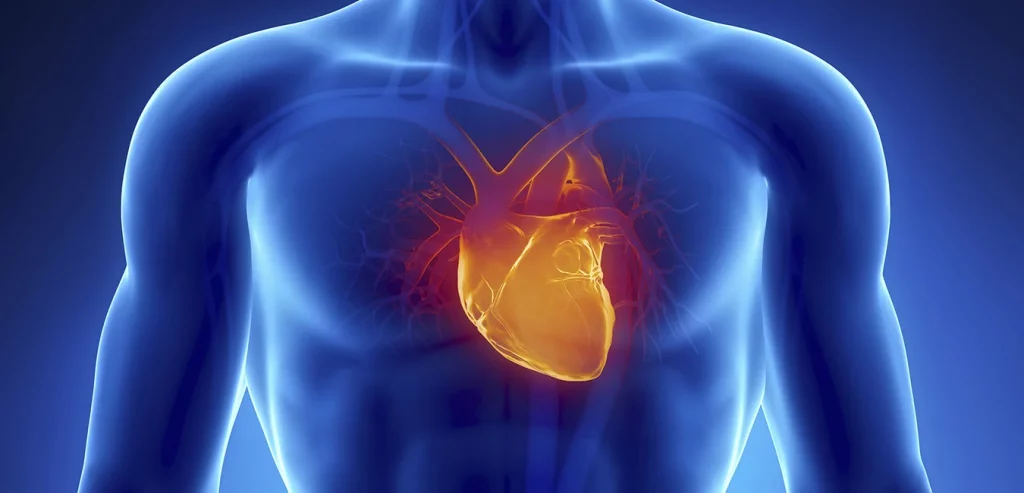Inflammation in the body can cause a range of disorders and conditions that may result in death. The heart is one of the most important organs in the body and any inflammation that occurs in the heart is a major concern. There is no hard data on how many deaths occur from heart inflammation, but some researchers have estimated that it results in millions of deaths each year.
Many researchers theorize that inflammation in the heart interferes with proper healing. Chronic heart inflammation will result in long-term health problems. Thankfully, researchers are rapidly developing new therapies and technologies to fight heart inflammation. Stem cells have shown great promise for patients that are experiencing heart inflammation.
What Is Heart Inflammation?
Inflammation is the body’s response to an infection or injury. This is typically a good response from the body. The white blood cells are being sent to the area of the body where there is an injury or bacteria and viruses. The chemicals from the white blood cells will enter the blood and/or surrounding tissues to protect the body. These chemicals, called inflammatory mediators, cause the small blood vessels in the affected tissue to dilate, or become wider. This increases the blood flow to the damaged or infected area.
The additional blood flow will bring even more immune system cells to the affected area, which will further help the healing process. Some of the chemicals may cause fluid to leak into the unaffected tissues, which would result in additional swelling. The immune system can often misidentify invaders in the body and release white blood cells to areas that are not injured or infected. This body response will result in autoimmune disorders, such as arthritis.
This can occur in the heart, which can result in long-term damage to various tissues in the heart. There also may be heart damage, bacteria, fungi, or viruses that can cause inflammation in the heart. Whether the heart inflammation is an autoimmune disorder or injury, heart inflammation poses a serious health risk to patients. There are four types of heart inflammation, which vary and can lead to different types of diseases and conditions.
Endocarditis
Endocarditis occurs when the inner lining of the heart chambers and valves becomes inflamed.
Typically, bacteria is the most common cause of endocarditis. The bacteria can enter into your body via the bloodstream and build up in the heart chambers and valves. Typically, the immune system can fight off this type of inflammation, but there is a possibility that a patient’s immune system can fight off the bacteria. Additionally, these bacteria clumps can break off and block blood flow and spread the infection.
Myocarditis
This type of inflammation occurs in the heart muscle that is responsible for pumping blood to the rest of the body. When the muscle becomes inflamed its ability to perform its function is reduced. Depending on how severe the inflammation is, patients may experience a variety of conditions. Some patients may experience an abnormal heartbeat, chest pain, or trouble breathing, while severe cases can result in heart attacks or strokes.
The cause of this inflammation is not always clear. Often, myocarditis is the result of an infection that has infected the heart muscle. These infections can be viral, bacterial, parasitic, or fungal. When the body responds to these infections, the heart muscle can become inflamed and damaged during the process. Autoimmune disorders can also result in damage to the heart muscle. The heart inflammation can last for a long period of time, which results in further damage to the heart.
Pericarditis
The third form of heart inflammation is called pericarditis. Two thin layers of tissue that surround the heart and help hold it in place become inflamed. When the tissue layers become inflamed they can rub together, which can cause a patient great pain. There are a number of causes of this type of inflammation from a heart attack to radiation therapy. Most of the time this inflammation will not result in serious problems, but in rare cases it can lead to death.
Myopericarditis
The final form of heart inflammation is a combination of both pericarditis and myocarditis. This type is less studied than the other three forms. This type can result in many health problems as the more inflammation there is the more risk there is for the patient.
More Americans are going to be dealing with these types of heart inflammation as COVID-19 has infected a large percentage of American citizens. New research shows that many patients may experience heart inflammation after developing COVID-19.
Heart Inflammation From COVID-19
Another issue that has recently been identified is heart inflammation from COVID-19. Patients have developed myocarditis after contracting the disease. The heart muscle is either damaged or inflamed after developing the disease.
Researchers have discovered that many patients who fully recover from COVID-19 have heart inflammation months after they contracted the disease. Many of these patients were asymptomatic. They had no visible symptoms from the disease, but still incurred heart inflammation and damage from the disease.
Researchers scanned the hearts of 100 COVID-19 patients about two months after they had contracted the disease. Of the 100 patients, there were 78 with cardiac abnormalities and 60 of those patients had active heart inflammation. Many of these patients reported that they had lingering symptoms, such as shortness of breath and fatigue. Heart inflammation could explain many of these symptoms.
It is critical that the medical community develop new therapies and treatments in order to reduce heart inflammation for COVID-19 patients.
Conventional Treatments
Conventional treatments are aimed at reducing the amount of heart inflammation the patient is experiencing. These treatments are effective in some cases, but they do not work for all patients who experience heart inflammation.
Medications
If the heart inflammation is caused from an infection, medications may be able to help the body fight off the infection. Antibiotics, antivirals, and antifungal medications could work depending on the type of infection. Corticosteroids are an option to reduce the immune system’s response to reduce inflammation. These medications can help with some autoimmune disorders, such as lupus. Corticosteroids do have long-term side effects, such as increased risk of infection.
Surgery
In extreme cases, a medical professional will recommend heart surgery in order to address the issue. A surgeon may have to go into the body to reconstruct the heart. They would remove the damaged tissue and potentially repair any damaged valves or other tissues. Surgery on the heart is always an extremely risky procedure as there are many complications that can occur. Many patients are also hesitant to turn to surgery as it can be an intimidating procedure.
Life-Style Changes
Some heart inflammation conditions can be improved by changing a patient’s lifestyle. The severity of the inflammation can be reduced, but the underlying problem may not be addressed properly.
There are no effective immunomodulatory treatments to prevent the immune system’s response of creating proinflammatory mediators. When a cytokine storm is produced, many patients are left with little to no treatment options that can improve their condition. Patients and their families are left hoping that their body can recover.
With all of these considerations, it is no wonder that researchers have looked into alternative methods to treat heart inflammation. Stem cells have shown that they have immense anti-inflammatory and immunomodulatory properties. Researchers are hopeful that stem cells will be able to create new therapies and treatments that can properly reduce heart inflammation.
How Would Stem Cells Reduce Heart Inflammation?
Stem cells inherently have anti-inflammatory properties that reduce inflammation in the target area. Several studies have looked at various inflammatory diseases and many of them came to the conclusion that stem cells reduce inflammation. Mesenchymal stem cells are immunosuppressive cells. These types of cells are useful in reducing inflammation in the body by suppressing the body’s immune system response. They release a number of anti-inflammatory factors and decrease monocyte activation.
Researchers are not 100% sure exactly how stem cells encourage anti-inflammatory processes in the body. There are a few competing theories on how the process works. Stem cells have the ability to adapt their metabolic processes to fulfill energy needs in the body. Unlike many other cells, stem cells have the ability to create energy by just using sugar. The inflammatory stimuli that stem cells produce are greatly improved when this type of process is used.
Whatever pathways are responsible for stem cells, the effects of stem cells on inflammatory conditions are clear. Stem cells are able to encourage the immune system to reduce the number of inflammatory cytokines that are produced. This is a reason why there are currently many research projects underway that are looking to utilize stem cells to treat COVID-19.
In fact, BioXcellerator created a clinical trial that is currently underway that is looking into using stem cells for patients with COVID-19. Our team has been at the forefront of stem cell research for several years. We hope to see great progress in the development of a stem cell treatment for COVID-19. At the heart of this condition is stem cells’ ability to treat inflammation.
Stem cells have the potential to treat a number of inflammatory conditions, including heart inflammation.
Stem Cell Therapy May Be Able To Reduce Heart Inflammation
Researchers have been investigating the use of stem cells for a variety of inflammation related conditions and diseases. Everything from arthritis to lupus has the potential to be treated by utilizing stem cell therapy. These exciting research projects show just how powerful stem cells can be in the future of treating heart inflammation and heart disease.
Stem Cells To Reduce Immune System’s Response
Stem cells have shown that they have an ability to reduce the body’s immune system response. There have been numerous studies that have shown that stem cells have an immunomodulatory effect on the immune system. These effects reduce the severity of an immune response when there is no need for that level of response.
Stem cells increased the production of a number of immunomodulatory factors including, PGE-2, TGF-β, IL-10, and IL-6. These factors help to maintain a positive immune response. The body will not become damaged from excess inflammation. Researchers do not fully understand how stem cells are able to reduce the immune system’s response.
Stem cell therapy may be helpful in preventing heart inflammation from getting to a point where it damages heart tissue. Early stem cell therapy intervention could potentially save millions of dollars and prevent many heart related conditions, such as a heart attack. Stem cell therapy also can repair damaged tissue in the heart.
Reducing Inflammation And Using Stem Cells
Another study showed that by reducing the amount of inflammation in the heart, stem cell therapy was even more effective. Inflammation is one of the biggest barriers to successful stem cell therapies. Researchers are just beginning to understand exactly how inflammation prevents stem cells from doing their job. Inflammation will actively prevent stem cells from accomplishing their goals. Inflammation reduces the therapeutic healing effects that stem cells promote in the targeted area. Stem cells may even be actively killed when inflammation is present in the targeted area.
Reducing inflammation at the target site will be important to create stem cell therapies that are extremely effective for various conditions and diseases, including heart inflammation. Researchers have found that an enzyme called epoxide hydrolase plays a part in causing heart inflammation. This has led to an interesting study from researchers at UC Davis Health.
The researchers used a drug to block the enzyme in a group of mice. One group of mice received stem cells, but no enzyme blocker, another group received stem cells and the enzyme blocker, another group received no stem cells, but received the enzyme blocker, another group of mice did not receive any treatment, while the last group received both the blocker and the stem cells.
The results of the study showed that stem cells were effective in treating the heart damage. When the inflammation was reduced, the stem cells were able to fully utilize their regenerative properties to heal the heart tissue. The group of mice that was treated with the enzyme blocker and stem cells had improved cardiac function and reduced scar tissue in the heart muscle.
Though the study was performed on mice, it does show how stem cells will be able to repair heart damage if inflammation is controlled. Researchers are hopeful that this study will pave the way for a better understanding of how inflammation plays a role in the healing process.
Stem cells may be used in combination with other anti-inflammatory drugs. The natural healing process will greatly improve as the stem cells will not die when they reach the inflamed area. This process could be used to help COVID-19 patients who have experienced heart inflammation and damage.
Stem Cells To Help With COVID-19 Heart Inflammation
Patients who have heart damage from COVID-19 may be able to utilize stem cell therapy in the future to treat their condition. Stem cells can help reduce the inflammation of the heart that many patients experience after recovering from the disease. Patients will be able to recover from COVID-19 more quickly than before.
One day a series of stem cell treatments may be used in order to fight heart inflammation and heart damage. One stem cell treatment could be used to drastically reduce heart inflammation. Then medical teams would be able to use a second stem cell treatment to encourage the heart tissue and muscle to repair itself. This series of treatments would allow the body to fight inflammation and heart disease naturally.
Reach out to your local healthcare provider to learn more about how stem cells could improve your heart inflammation. Stem cells have the potential ability to reduce inflammation and repair damaged tissues in the heart. The future of stem cells therapeutic ability for heart inflammation is incredibly exciting.


